The Voice of the People in Times of Crisis: A Vox Pop Radio Program Guide, 1935 to 1948
The LAB broadcast archives are known for documenting the careers of well-known broadcasters, events of national and international importance, and the operations of networks and stations in both television and radio. But these records also include the legacies of everyday Americans, many of whom appeared on quiz programs, talent shows, and audience participation programs. For example, on March 23, 1942, Sgt. John L. Berlew of the United States Armored Force stood at a CBS radio microphone and described how he drove a milk truck in Jamaica, Long Island and an Army tank at Ft. Benning, Georgia. The occasion was a broadcast of the radio program Vox Pop from Ft. Knox, Kentucky where hosts Parks Johnson and Wally Butterworth interviewed Sgt. Berlew and 5 other men serving in the United States Armored Force.
Sgt. Berlew was one of the more than 3,000 men, women and children Johnson and his co-hosts interviewed over on Vox Pop from 1935 to 1948. Johnson was not the only broadcaster ever to host an audience participation program or visit a military camp in wartime, but he was a meticulous record keeper who created a large collection of material that documents the program he hosted and the people he interviewed.
The Parks Johnson Collection on Vox Pop gives a detailed look into network radio and American culture during the Great Depression, World War II, and the early post-war years. To guide social historians, folklorists, military historians, genealogists and other researchers with an interest in these periods, the Vox Pop Program Guide allows researchers to explore the broadcasts and the people interviewed on the program.
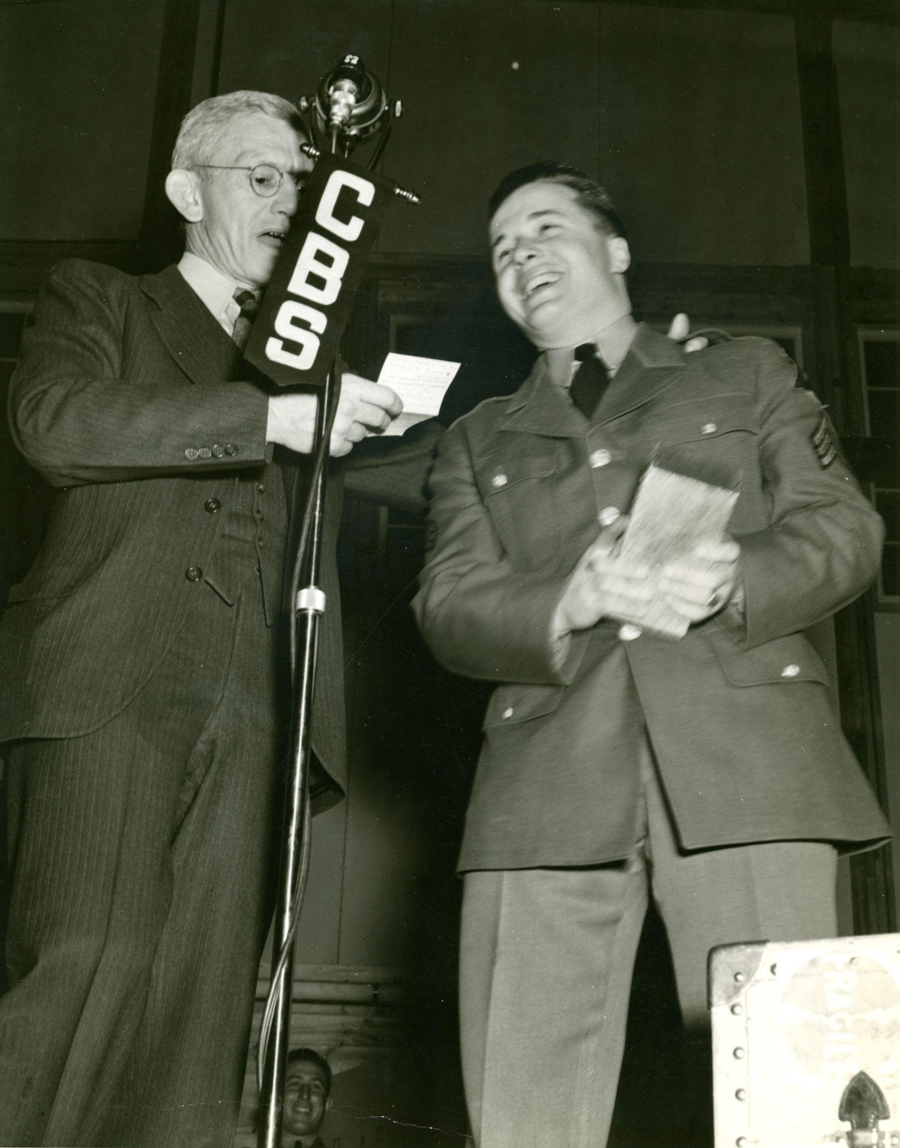
Sgt. John L. Berlew holds a gold brick during his interview by Parks Johnson. Fort Knox, Kentucky, March 23, 1942.
Parks Johnson Collection on Vox Pop
"[I] am 'cursed' with [the] habit of keeping exact and accurate records of any and everything I do. I know the name, address and have a fairly accurate picture of practically every person [I] have ever interviewed." —Parks Johnson, 1937.1
When Parks Johnson made this statement to the NBC publicity department in 1937, he had been hosting Vox Pop for 5 years, first in Houston, Texas, then in New York City. By the time the show went off the air in 1948, Johnson and his co-hosts had broadcast from 44 states and six countries, interviewing more than 3,000 men, women and children from all walks of life
During his travels, Johnson continued to keep "exact and accurate records," creating a collection of material that gives detailed insight into the activities of a network radio program and the lives of people living during the Great Depression and the Second World War.
For example, he kept:
Program Notes
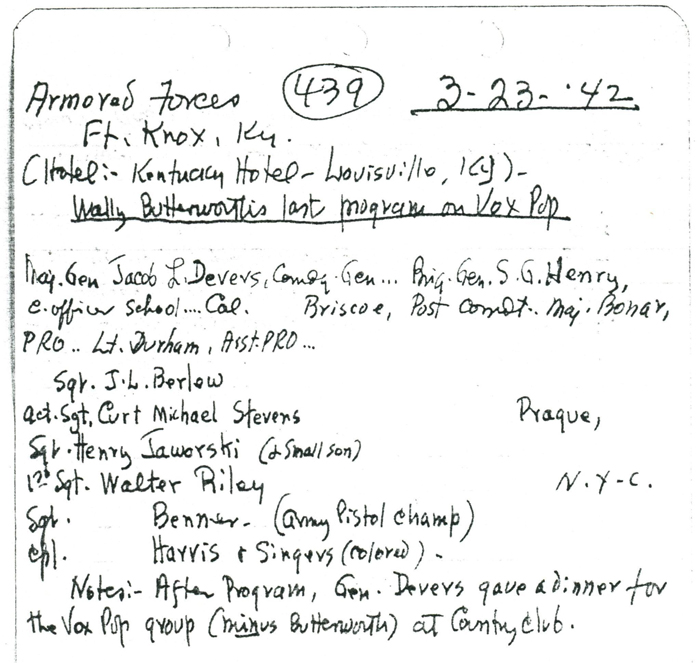
Johnson's detailed notes for the Fort Knox broadcast. One of 400 pages of notes he compiled documenting over 700 Vox Pop broadcasts. (Parks Johnson Collection on Vox Pop, Box 2, Folder 3, p. 140).
Photographs
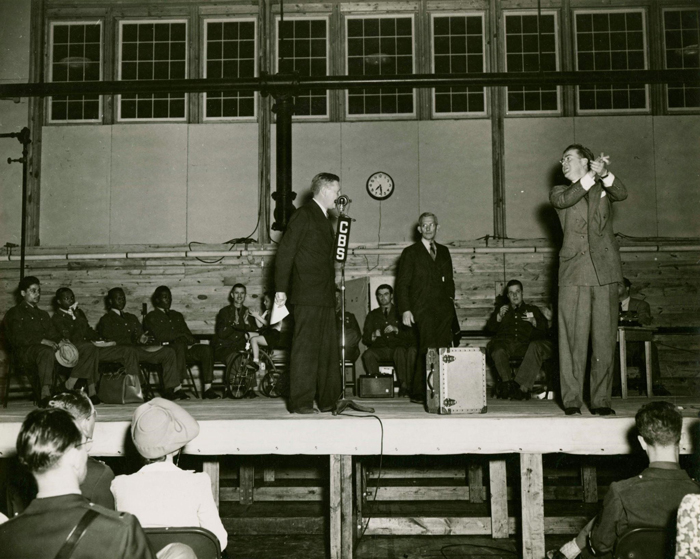
A photograph capturing the closing moments of the Vox Pop broadcast from Fort Knox. The collection contains nearly 2,000 photographs taken during the Vox Pop broadcasts. These photographs document the interviewees, the gifts they received, and the hosts and other production personnel. These photographs also document the broadcast location, many which no longer survive. (Parks Johnson Collection on Vox Pop, Box 3, Folder 8).
Interview Questions
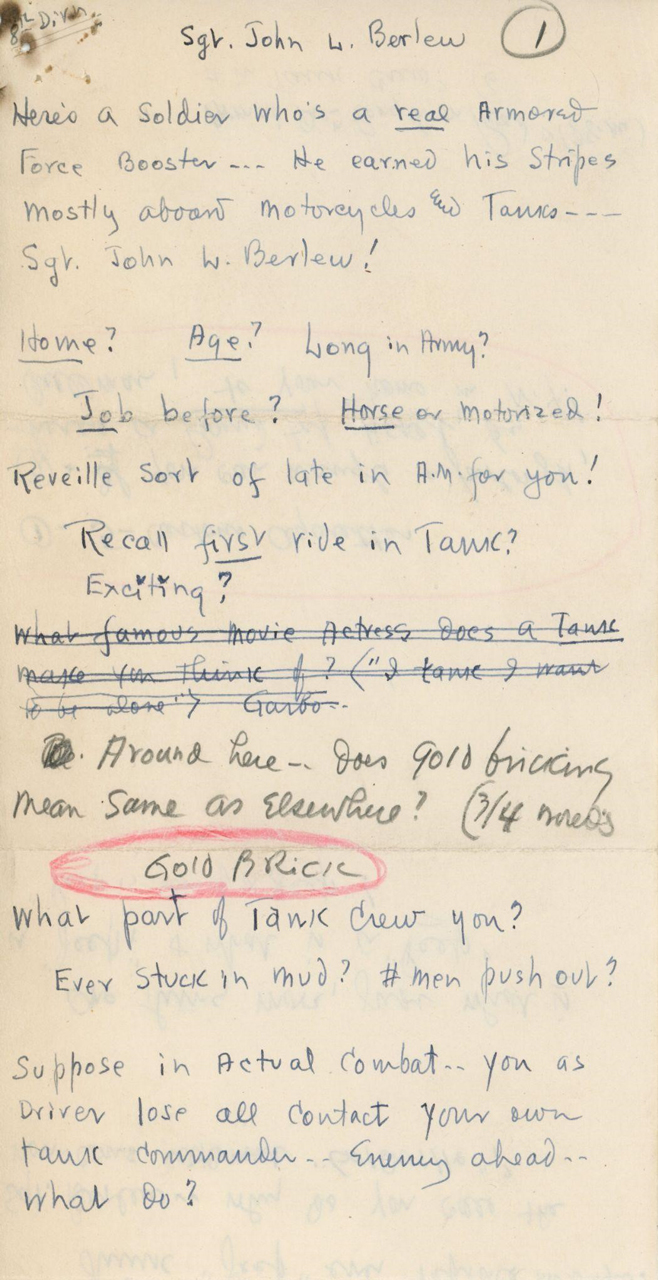
The interview questions seen in Johnson's hand during his interview with Sgt. Berlew. Each interview was carefully planned and interviewees were pre-screened for human interest value. (Parks Johnson Collection on Vox Pop, Box 26, Folder 26, p. 140).
Questionnaires
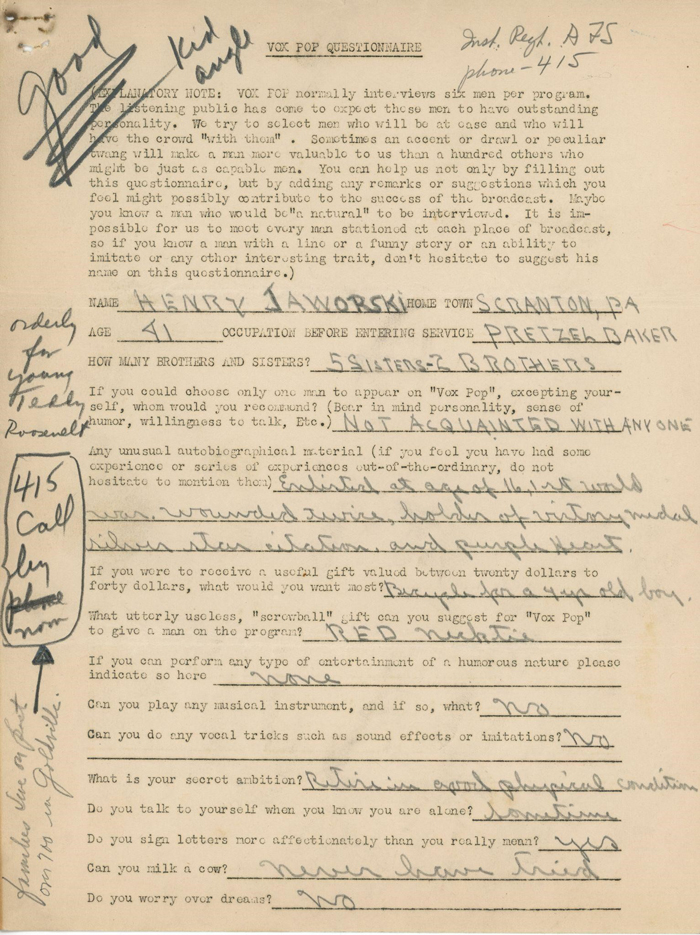
The questionnaire filled out by Sgt. Henry Jaworski to be considered for inclusion in the Fort Knox broadcast. Hundreds of such questionnaires were distributed at each broadcast location to select the five or six people who would be interviewed on air. (Parks Johnson Collection on Vox Pop, Box 26, Folder 26).
Audio Recordings
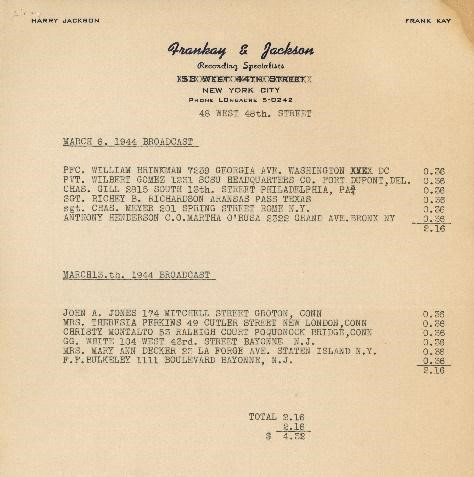
An invoice from recording engineers Frank Kay and Harry Jackson, who sent souvenir copies of the broadcasts to many of the interviewees. These invoices contain the names and addresses of the interviewees. (Parks Johnson Collection on Vox Pop, Box 20, Folder 18).
Program Guide
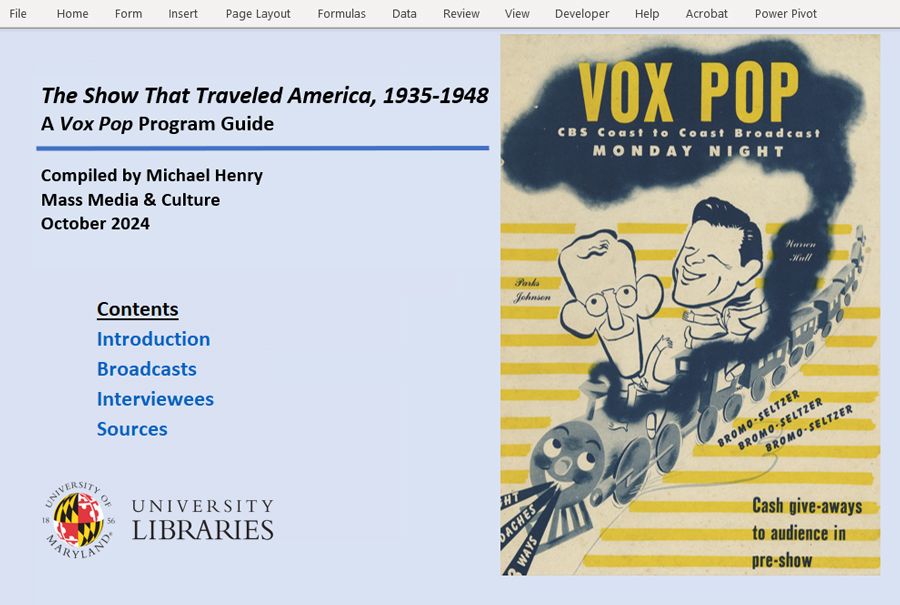
Program Guide title page.
Titled “The Show That Traveled America: A Vox Pop Program Guide”, the guide can be downloaded from the “Inventories/Additional Information” tab of the Parks Johnson Collection on Vox Pop finding aid. The guide is an Excel workbook that allows users to search the data using the filtering and sorting tools common to Excel worksheets.
Broadcasts

Program Guide entry for March 23, 1942, broadcast from Ft. Knox, KY.
Researchers can explore the following fields to discover details about the 726 broadcasts that aired from July 1935 to May 1948. The fields include:
- Broadcast date
- Subject
- Location
- City
- State
- Country
- Host
- Network
- Sponsor
Interviewees

Program Guide entry for John L. Berlew on March 23, 1942.
Researchers can explore the following fields to learn details about the lives of the more than 3,000 men, women, and children who were interviewed on the show from 1935 to 1948. In the 1930's, interviewees participated in trivia contests for cash prizes. In the 1940's, Johnson focused on the interviews and awarded the interviewees with surprise gifts relating to their hobbies and personal needs.
- Interviewee Name
- Broadcast Date
- Interviewer Name
- Gifts
- Gender
- Background
- Age
- Age Group
- Home Country
- Home State/Province
- Home City
- Military Status
- Military Service Branch
- Military Rank/Rating
- Birth Year
- Death Year
Historical Value
Filtering these fields allows social historian, genealogists, folklorists and others to discover the military history was only one aspect of American culture that Vox Pop documented with the broadcasts and interviews. Researchers can now explore state and local history and many of the historical themes and communities that the program highlighted.
State and Local History

Filtering the "City" field in the "Broadcasts" tab.
Vox Pop originated in Houston, Texas in 1932, but from 1935 to 1939, the program broadcast exclusively from New York City. Johnson and his co-hosts Jerry Belcher and Wally Butterworth originated from hotel lobbies, restaurants, train stations and the New York World’s Fair.
In the 1940’s, the program expanded its scope by broadcasting from locations around the country. During World War II, Parks Johnson and his co-hosts Wally Butterworth and Warren Hull traveled to training camps, hospitals, defense plants, and other locations around the United States and Canada involved in the war effort.
After the war, Johnson and his co-host Warren Hull included broadcasts from Paris and London to promote international travel.
By 1948, Vox Pop had traveled to 238 cities in 44 states, broadcasting from campuses, theaters, schools, factories, fairgrounds, and other local venues. Johnson and his staff worked with local radio broadcasters and city officials to produce the programs from these locations.
Historical Themes and Communities
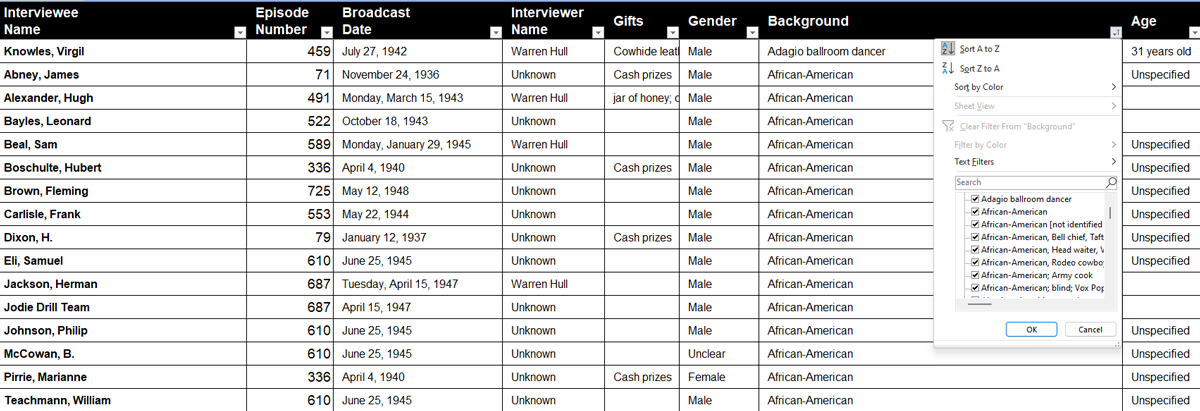
Filtering the "Background" field in the "Interviewees" tab reveals a number of African American interviewees.
African Americans
Parks Johnson made a special effort to identify the African American men and women he and his co-hosts interviewed on the program. These men and women included students, entertainers, aviators, waiters, servicemen, factory workers, and clergymen.
Agriculture:
Vox Pop frequently highlighted American agriculture, broadcasting from state fairs, farms, and agricultural institutes. Johnson and his co-hosts interviewed farmers, members of 4-H clubs, students, scientists, lumbermen, and other involved in agriculture.
Education:
Beginning in 1940, Vox Pop broadcast from elementary schools, high schools, college campuses, and military academies. Johnson and his co-hosts interviewed students, teachers, coaches, and administrators.
Hospitality Industry
Vox Pop broadcast from hotels, restaurants, summer resorts, and other locations relating to the hospitality industry. They interviewed managers, waiters, chefs, bellhops, doormen and other staff members.
Manufacturing:
Vox Pop frequently broadcast factories, interviewing managers, foremen, and workers, often together on the same stage. During World War II, the interviewees included the men and women who were making tanks, aircraft, and firearms.
Material Culture:
Beginning in 1941, Vox Pop awarded interviewees with surprise gifts based on their hobbies and personal needs. These gifts included portable radios, electric razors, kitchen appliances, wristwatches, clothing, and sporting equipment.
Media and Entertainment:
Vox Pop often highlighted media and entertainment, broadcasting from Broadway theaters, motion picture premieres, radio studios, and newspaper offices. Johnson and his co-hosts interviewed Hollywood celebrities, newspaper editors and cartoonists, and journalists.
Politics:
Johnson and his co-hosts interviewed many people from the world of politics, including mayors, governors, senators, and congressmen. They even interviewed two future United States Presidents, Ronald Reagan and Richard M. Nixon.
Sports:
Sports and athletics were common themes during Vox Pop broadcasts. Johnson and his co-hosts interviewed coaches and players from the worlds of baseball, boating, bowling, boxing, college basketball, skiing, and other sports.
Transportation:
Parks Johnson frequently highlighted transportation, including railroading, aviation, and boating Pop broadcasts from train stations, factories, airfields, and ships at sea to interview train engineers, pilots, and ship captains.
Women:
Parks Johnson and his co-hosts interviewed women of all ages and backgrounds. These women included artists, students, and telephone operators. During World War II, these included women working in defense plants and serving in the military branches as WAACs, WAVES, and SPARS.
World War II:
During World War II, Vox Pop broadcast from military bases, hospitals, defense plants, and other locations involved in the war effort. Johnson and his co-hosts interviewed men and women of all ranks serving with the Allied armed forces.
Conclusion
While most people who appeared on audience participation programs have been forgotten, Parks Johnson’s record keeping allows us to learn details about the lives of thousands of average Americans who appeared on Vox Pop. We hope to share these details with their families, their communities, and others who have an interest in their stories. In turn, we may be able to learn more about the lives of the interviewees after their appearance on the show. For example, how did appearing on Vox Pop affect the life of Sgt. Berlew? Did he survive the war? Did he marry and have a family? Did he have a career after the war?
The program guide will be updated over time as we learn more information about the broadcasts and the interviewees. If Parks Johnson interviewed a member of your family or broadast from your community, we would be glad to hear from you. We can be contacted at https://umd.libanswers.com/.
Created by Michael Henry (mlhenry@umd.edu) of Special Collections in Mass Media and Culture, University of Maryland Libraries. Website by Scotty Beland.
1 NBC Questionnaire, June 22, 1937, p. 5. Parks Johnson Collection on Vox Pop, Box 1, Folder 42.
